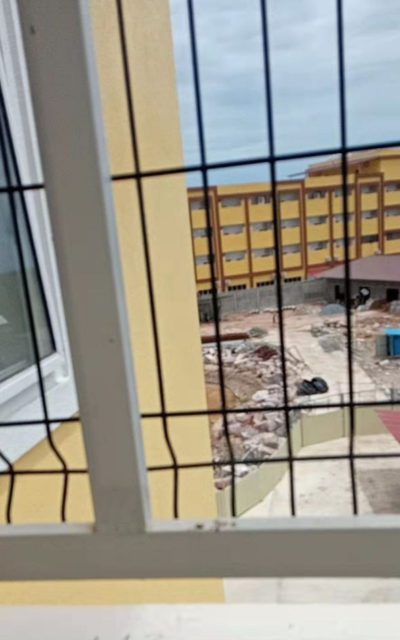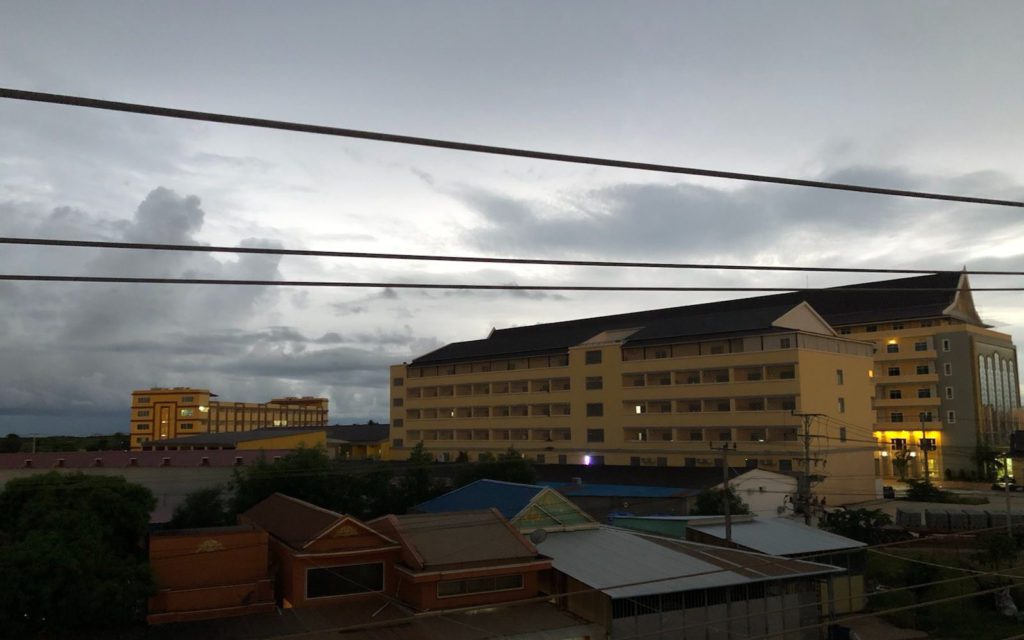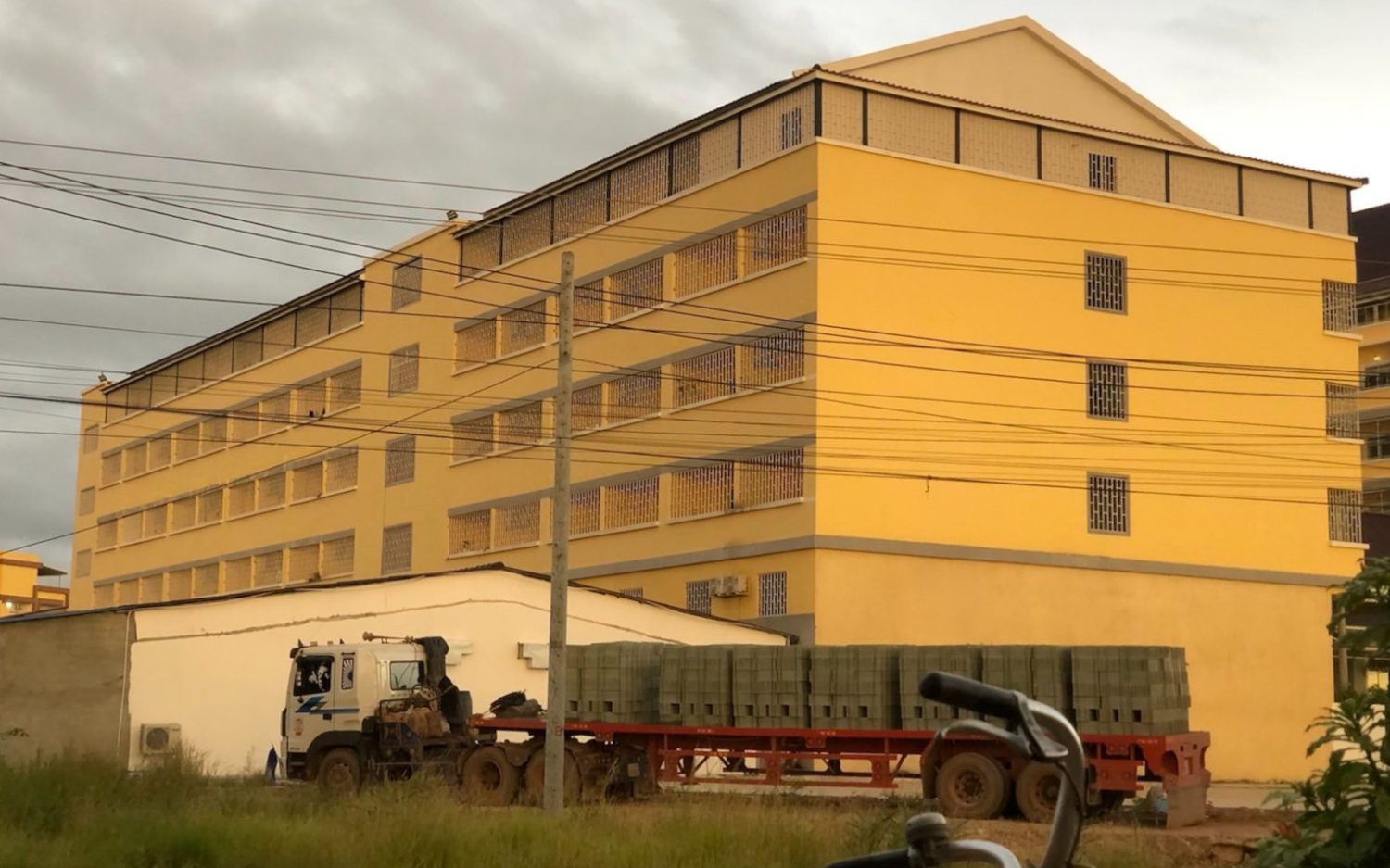The plea came as so many others have — a Facebook post to a live-stream address by Prime Minister Hun Sen.
“Hello Prime Minister Hun Sen, I am a Chinese. I was tricked into a scam park in Baima City, Kampot Province, forcing me to work in fraud, if I didn’t work they would shock me with an electric baton, hit me with a stick, please help me, I really I don’t want to die, please.”
The young man is just one of the latest foreign nationals claiming they’ve been held against their will by employers in Cambodia, forced to work in online scam networks. Though such stories have become all too common in the country, Chen’s case has offered a rare window into how Cambodian law enforcement agencies respond to forced labor reports.
VOD reporters followed the case of Chen from his post calling for help to the efforts of a friend of his, a young Chinese man living in Phnom Penh who identified himself as Yuan. The man agreed to speak to VOD using only family names for himself and the detained Chinese national out of safety concerns.
Yuan’s journey, over several days last week, began with the hope of enlisting local police in a rescue. But provincial police in Kampot are now investigating Chen’s case as a criminal matter — one in which Chen is the prime suspect.
Going South
Accompanied by reporters, Yuan traveled to coastal Kampot province where Chen claimed he was held in a modern slave operation.
Yuan wanted police to handle the case and help free his friend, who had told Yuan over the course of several text messages that he was increasingly afraid for his physical safety after publicly posting on Hun Sen’s livestream. Yuan said he’d already called the Chinese Embassy, but had been instructed to call a national hotline to report crimes against foreigners. He said he didn’t know where to find that.
So Yuan’s official attempts to free his friend began with a Wednesday night visit to the Russei Srok Khang Lech commune police station, less than a few kilometers away from the WO Casino complex in Kampot. The unfinished facility — a large set of buildings arranged in a square “U” shape around a central courtyard — is just down the road from the Vietnamese border.
At the police station, as reporters watched, Yuan spoke on the phone with an interpreter he knew from Phnom Penh who can fluently speak both Chinese and Khmer.
With her help, Yuan told the commune police chief Chan Phakdey and his subordinate about Chen, answering their questions and providing information about his friend. He also showed the police photos of both his and Chen’s passports, as well as proof of Chen’s former employment at a hotel in Sihanoukville.
This first visit to the police happened at about 8 p.m. that night, and the officers seemed receptive to helping Yuan. They also knew without being told which facility his friend was allegedly being held at. There had been “two or three” similar cases as Chen’s, the police said, requiring people to be taken from the WO Casino.
At the same time, they were skeptical of his story and resistant to treating the matter as an emergency.
“It is night time, how can we cooperate with the company?” asked the subordinate. “Here we file a complaint, and I will report in detail to leaders so that they can cooperate with the company.”
The chief also asked about any contracts Chen might have signed during his time at the casino. Yuan said his friend had told him he worked 14 hour days and earned about $1,000 per month. Chen had reported that he had been forced to sign a paper, but Yuan didn’t know in detail the terms of this contract.
He did say that Chen had been promised he would be allowed to leave the facility after one year of labor, but that this promise had been ignored after the year was up.
The police officers seemed to consider this information to be contrary to Chen’s claims of being exploited.
“This is not detention, since they give him a salary,” one of the officers said, stating that the practices described were in line with labor laws.
The other officer summed it up a different way.
“There is no detention, it is just they do not allow him to get out,” he said.
Still, the police told Yuan to tell his friend not to worry. They would coordinate with their higher-ups, they said, before visiting the casino in the early morning and delivering a status update.
When Yuan and reporters returned to the station at 8 a.m. Friday, the official chain of command had become more complicated.
The chief said that, since the case involved a Chinese national, his office had to contact the Chinese Embassy to coordinate with the national immigration police. From there, he said, the immigration police would get in touch with provincial police, who would intervene.
Aside from explaining an apparent web of bureaucracy preventing direct action, there wasn’t much the local police could do. The chief said Yuan could not even file a complaint at his office.
After hearing that, a VOD reporter made a call directly to the national immigration police to enquire about the case. A representative there told him they would send an officer to investigate the claim.
With that, reporters went to a coffee stand across the street from the WO Casino to watch for police. After some time had passed, they walked in the drizzling morning rain along a country road running behind the large facility, which rises from wetlands in easy reach of salt farms on the seaside.
There, the morning peace was broken with two urgent developments communicated to Yuan: the first, a message from Chen alleging that the people overseeing him at the WO Casino had beaten him. The second, a call from the facility manager that he would voluntarily let Chen go free.

Yuan and reporters went swiftly to the casino. They parked outside and walked into its courtyard, which is slightly obscured by a front entranceway of towering arches. The blocks rising on three sides appeared to be full of hotel or dormitory rooms — their exposed balconies were each screened off with metal security bars, some of which appeared to be of a thin, temporary quality.
The courtyard was divided in half by a similarly temporary-looking wall, such as those used to screen off construction sites. The wall was topped with rolls of razor wire and manned by two guards. It also had a central doorway cut into it, through which some people who appeared to be Cambodian could be seen milling about in the other half of the courtyard.
While Yuan and reporters briefly stood before the wall waiting for an update, the facility manager called Yuan and told him he could meet at the police station, where he’d be taking Chen.
That prompted another swift journey, first to the commune station, which ended up being the wrong place, and then into Kampot city, where reporters learned the manager had taken Chen to the provincial police headquarters.
Yuan had hoped this would be the end of his quest. But police said this would not be an immediate process — they were questioning his friend and would take some time.
At the time, the visiting trio of Yuan and reporters knew little of what was happening inside the station. Police told them they could wait in a seating area in the headquarters parking lot, where they sat in a small cabana and passed the time.
As the hours went by, Yuan’s spirits fell. Finally, police brought Chen out, in handcuffs, and allowed him to speak briefly with his friend before taking him back into the station. After that, police attention on Yuan and reporters increased, and they stationed an English-speaking officer to sit next them in the parking lot to observe their conversations.
Police also briefly questioned one VOD reporter, asking again his name and affiliation before forbidding him from taking any photographs of Chen.
“He dared to comment on samdech’s Facebook, and his comment was not true,” one officer said of Chen, adding that his comment was a “big issue for the leaders.”
“He is a foreigner who lives in Cambodia, so when he does something, he has to come to meet with the authorities — he cannot comment like this,” he said, continuing that Chen’s story had changed under questioning.
Yuan saw Chen once more that day, but only at a distance as police brought him out in handcuffs to load him into a van for transport to Sihanoukville. The slim 22-year old wore a hooded sweatshirt, and police quickly brought him back inside the station when they saw that reporters were watching from the parking lot.
A pair of officers, one uniformed and one not, came out to speak with reporters. One told a reporter he was not allowed to take notes on what was happening.
“Why do you need to write? Just remember it all in your mind,” the officer chided.
At the same time, he spoke politely to both the reporters and Yuan, assuring them at length that Chen would not face any problems in Sihanoukville. While he spoke, officers behind him quietly loaded Chen into a gray police van and drove off.
With seemingly little else to do, Yuan and reporters got back in their own car to start the drive back to Phnom Penh. In total, they’d sat in the police parking lot for about four and half hours.
Yuan was discouraged that he’d been unable to secure the release of his friend to take him back to Phnom Penh. Still, as he repeated a message from Chen, Yuan still thought he’d achieved some kind of victory.
“Even if they take me to Sihanoukville, it is better than the casino,” Yuan said.

‘Exaggeration’
A call to a number listed on the banner of WO Casino led to a woman who passed the phone to a man who she said was her boss. But the man claimed to be a cleaner. He told a reporter there were Chinese people at the facility, but said he didn’t know anything else and hung up.
Kem Sarin, director of the Interior Ministry department of investigation and procedure, told a reporter on Thursday evening that Chen was under investigation for allegedly spreading fake news about the conditions of his detention.
“At first, he commented on samdech’s page that he was mistreated, beaten, electrocuted … but when [officers] asked him, he said there had not been [abuse], and he had commented like this because he wanted others to pay attention to take him out of there.”
“The province is undertaking procedures and making a report to me,” Sarin said. “It is related to the exaggeration of news.”












